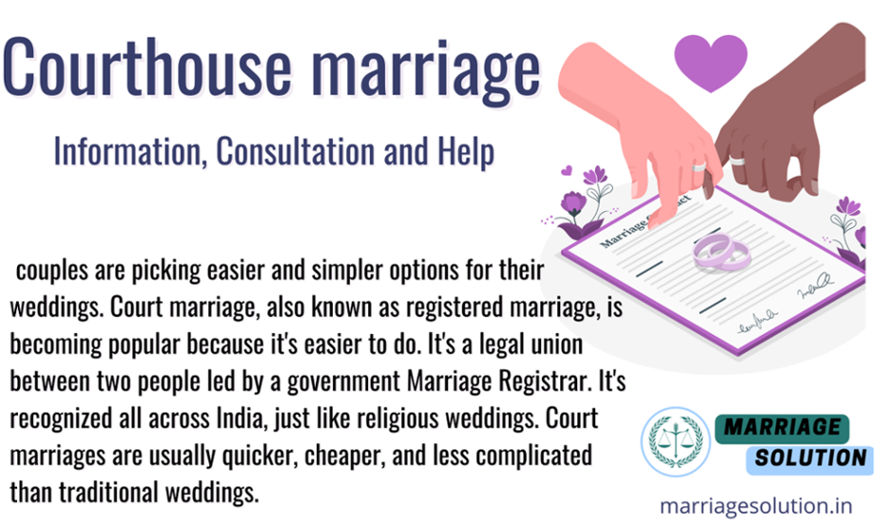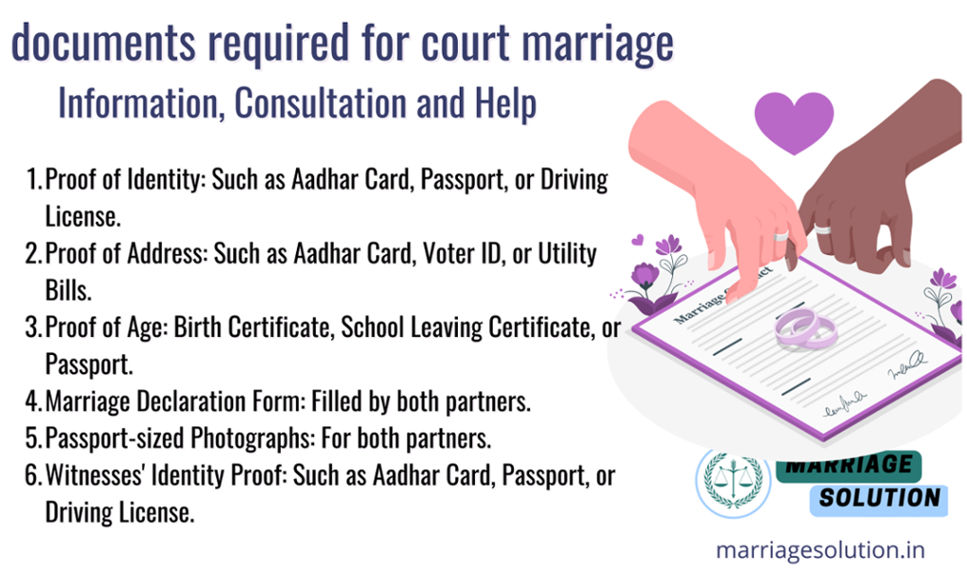MarriageSolution.in: Reliable Legal Partner

Introduction
Couples are increasingly opting for easy and uncomplicated wedding options. A popular choice is court or registered marriage, due to its convenience. It involves a legal union between two individuals under the guidance of a government Marriage Registrar and holds just as much validity as religious weddings throughout India. Compared to traditional wedding ceremonies, court marriages tend to be less complex, quicker in execution and cost-effective too!
1) documents required for court marriage

For the couple:
- Verification of Identity: Please present one of the
- PAN Card
- Driving License
- Passport
- Proof of Address: Submit any two of the following:
- Aadhaar card
- Electors Card (Voter Identity Card)
- A travel document called a Passport.
- Electricity statement (dated within the last three months).
- Recent telephone bill (issued within the last 3 months)
- An address proof can be obtained through a Ration Card.
- Two Passport-sized photographs
Providing passport-sized photographs is a standard requirement, it’s essential.
- Proof of Age: Choose from:
- The certificate that signifies the completion of secondary education is known as either School Leaving Certificate (SLC) or Secondary School Leaving Certificate (SSLC).
- If your date of birth is provided, you will need a PAN card.
- A passport is a document used for identification and travel purposes, issued by the government of an individual’s country of citizenship.
- Affidavits from the Couple: Prepare separate affidavits on non-judicial stamp paper, detailing:
- Date of birth
- Status of marriage (single, bereaved, separated legally)
- Religion
- Any legal proceedings that are currently pending must be disclosed.
For witnesses (two required, one from each side):
- Proof of Identity: Proof of identity requires documents such as a PAN Card, Driving License or Passport similar to what the couple provides.
- One Passport-sized photograph : Each witness must provide one passport-sized photograph.
2) apply for court marriage online
Online applications for court marriage are still unavailable nationwide in India as of March 7, 2024. Despite pilot projects being initiated by certain states like Tamil Nadu and Delhi, the implementation is currently pending across the nation..
For Court Marriage in Maharashtra:
- Document Preparation: Collect the required documents as detailed in the previous answer, which includes proof of identification, proof of address, confirmation of age and affidavits. Additionally gather details pertaining to witnesses.
- Visit to Marriage Registrar’s Office: Visit the Marriage Registrar’s office by first identifying the district court where you intend to have your wedding ceremony.
- Application Submission: To submit your application, both you and your partner should visit the office to collect an application form. Once you have it, complete it together and attach any necessary documents. Don’t forget to include payment for applicable fees!
- Notice Display: After submission, a notice will be exhibited at the court premises and your residential area for 30 days to permit any necessary objections.
- Marriage Ceremony Arrangement: If there are no objections raised during the notice period, the court will schedule a date for your wedding ceremony.
Although online application procedures for court marriage are not yet available everywhere, in Maharashtra individuals can still initiate the process through the traditional method mentioned above.
3)court marriage rules
1)Venue Selection: Couples can opt for designated marriage registration offices or district courts that adhere to their preferences and jurisdictional regulations when it comes to conducting court marriages.
2)Marriage Notices: Couples who plan to tie the knot must furnish written notification of their nuptial plans to the marriage registrar in the locality where they intend to wed. The notice should comprise crucial particulars like monikers, domiciles, ages, professions, marital positions and proposed wedding location.
3)Publication of Notice: Following receipt of the notice, it is customary for the marriage registrar to present it publicly for a designated duration (typically 30 days), providing an opportunity for possible objections to be voiced.
4)Objection Handling: The process of handling objections entails the opportunity for any individual with legally recognized justifications – such as current marital status or inability to give legal consent – to lodge their objection during the designated notice period prior to marriage.
5)Marriage Ceremony: After the notice period has ended without any objections, the marriage registrar conducts a straightforward wedding ceremony attended by witnesses and of course, the couple themselves.
6)Registration Process: After the notice period has ended without any objections, the marriage registrar conducts a straightforward wedding ceremony attended by witnesses and of course, the couple themselves.
7)Marriage Certificate Issuance: After the wedding ceremony, the couple along with witnesses and registrar complete the registration process by signing a marriage register that legally records their union.
8)Validity and Recognition:
Upon completion of the registration process, a marriage registrar issues a certificate to the couple as proof of legal marriage.
9)Legal Rights and Responsibilities: Marriages conducted in court according to applicable laws are considered legally valid and recognized both domestically and internationally. According to applicable laws, married couples have legal rights and obligations that encompass inheritance, property entitlements, as well as spousal maintenance.
10)Post-Marriage Procedures: After getting married, couples may have to revise their marital status on official papers like passports, bank accounts and insurance schemes.
4) court marriage office near me
Research: Start by researching the nearest marriage registration offices or district courts in your locality.
- Online Search: To find registration offices for marriage nearby, make use of online search engines or websites associated with the government.
- Contact Local Authorities: To inquire about court marriage facilities in your area, get in touch with the local municipal office or district administration.
- Visit Registrar’s Office: After locating the nearest marriage registrar’s office, make a trip to gain comprehension on court marriage procedures and prerequisites.
- Document Verification: When you come for your visit, make certain that you possess all the essential documents such as proof of identity, address verification, age certification and passport-sized snapshots before undergoing document authentication.
- Discuss Procedures:
To learn about the process of applying for court marriage and fees involved, converse with the officials at the registrar’s office. - Schedule Appointment: To initiate the formalities for court marriage, book an appointment with the marriage registrar if necessary.
- Follow Official Guidelines: Comply with all instructions stipulated by the marriage registrar’s office in relation to document submission, notification timeframe and any other lawful obligations.
- Witness Requirement: The registrar’s office mandates arranging for witnesses according to their guidelines. Typically, the marriage ceremony necessitates two individuals as witnesses in attendance.
- Attend Marriage Ceremony: Attend the Wedding Ceremony: Attend the wedding ceremony at the registrar’s office on the designated date, accompanied by your partner and witnesses.
- Sign Marriage Register: As directed by the marriage registrar, both you and your partner are required to sign the marriage register during the ceremony alongside witnesses.
- Receive Marriage Certificate: Once all the formalities are fulfilled, obtain your marriage certificate from the registrar’s office as an official evidence of your wedding.
Dr. Ambedkar scheme for social integration
If you require assistance with court or any other courthouse.
court or any other marriage-related issues, our Home – MarriageSolution.in: Your Trusted Partner in Family Legal Matters. Law Services, IPC Section blog, Expert Advice, court cases lawyer help. website may prove helpful. By completing our enquiry form and submitting it online, we can provide customized guidance to navigate through the process effectively. Don’t hesitate to contact us for personalized solutions; we are here to assist you whenever necessary!
What is a courthouse marriage?
A courthouse marriage, also known as a civil marriage or a civil ceremony, is a legal marriage ceremony performed by a judge or a court official at a courthouse or other government building.
How do I get married at the courthouse?
To get married at the courthouse, you typically need to obtain a marriage license from the county clerk’s office, schedule an appointment with the courthouse or city hall, and appear before a judge or court official to exchange vows and sign the marriage license.
What documents do I need for a courthouse marriage?
The documents required for a courthouse marriage vary depending on the jurisdiction, but generally include valid identification (such as a driver’s license or passport) for both parties and a marriage license obtained from the county clerk’s office.
Do we need witnesses for a courthouse marriage?
In some jurisdictions, witnesses may be required to be present during the ceremony and sign the marriage license as witnesses. The number of witnesses required may vary depending on local laws.
How much does a courthouse marriage cost?
The cost of a courthouse marriage varies depending on the jurisdiction and may include fees for the marriage license, courthouse ceremony, and any additional services such as copies of the marriage certificate.
